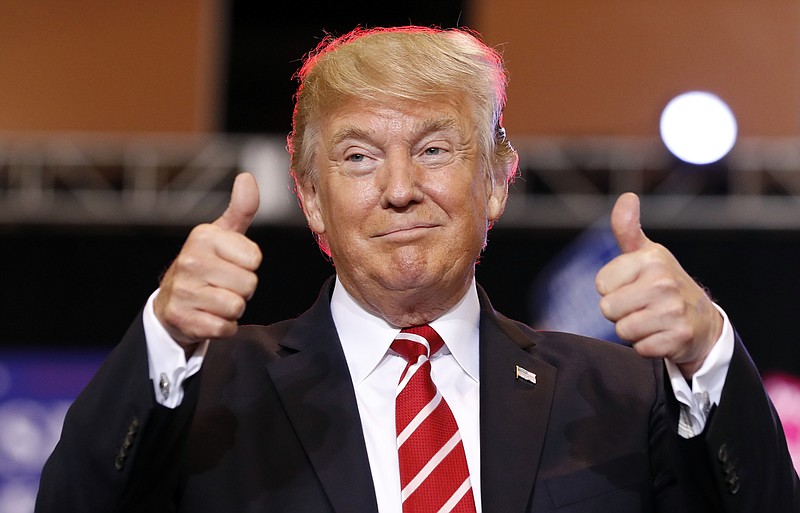Sigh. If only President Donald Trump denounced neo-Nazis as passionately and sincerely as he castigates journalists.
What could be an easier task than distancing oneself from Nazis or violent white supremacists? Yet Trump manages to make it infinitely complicated - and then get distracted by self-pity and excoriate reporters for committing journalism. The key strain of his sulfurous speech in Phoenix on Tuesday was an extended attack on "dishonest" reporters (including at "the failing New York Times").
Look, we in journalism deserve to have our feet held to the fire. We make mistakes all the time, and too often we are superficial, sensationalist, unfair, defensive or diverted by shiny objects. Critics are right that we in the national media are often out of touch with working-class America, and distressingly often, we are lap dogs instead of watchdogs.
Yet for all our failings, journalism remains an indispensable constraint on power. Trump has systematically tried to delegitimize the institutions that hold him accountable - courts, prosecutors, investigators, the media - and that's the context for his vilification of all them, for we collectively provide monitoring that outrages him.
The New York Times and The Washington Post have separately tallied Trump's lies, with The Post calculating that he has now made more than 1,000 misleading statements since assuming the presidency. That's a grueling pace of almost five a day, and it is accelerating (at the six-month mark, it was 4.6 a day). This prevarication proliferation is an indication that John F. Kelly is unable to rein in Trump, and that the problem was not Steve Bannon but the president himself.
Trump's caricature of journalists as dishonest is hypocritical, and it insults the courage and professionalism of my colleagues who sometimes risk their lives trying to get a story.
I also worry that Trump is buoying the repressive instincts of dictators around the world. Since Trump's election, I've been denied entry by Venezuela, Congo, South Sudan and Yemen, an unusual number of countries - and I wonder if foreign leaders believe that it is now easier to deny access to troublesome American journalists now that they are reviled by their own president.
Aside from Trump's desire to reduce scrutiny and accountability, there are other theories for why Trump finds it so difficult to denounce Nazis and other racists without getting diverted into rants about journalists.
One is that he has always had a soft spot for racists, ever since as a young real estate developer he was sued by a Republican Department of Justice for systematically discriminating against blacks. Over the years he has also been quoted as saying that "laziness is a trait in blacks," declined to distance himself from the Ku Klux Klan and periodically retweeted posts by neo-Nazis.
Another theory (these are not mutually exclusive) is that Trump is simply a thin-skinned narcissist who shares the white supremacists' sense of victimization. It was striking that in Tuesday's speech in Phoenix, he seemed to believe that the biggest victim in Charlottesville was not Heather Heyer, who was murdered, but himself.
Yet another possibility, which previously was mostly whispered but is increasingly openly discussed even by members of Congress, is that our president is mentally unstable.
The causes of Trump's bizarre behavior may be difficult to disentangle. But I hope that you, as members of the public, will understand what is at stake in his assault on the media.
We appreciate, not always gracefully enough, the public's efforts to keep us honest. We also are grateful for the outpouring of subscriptions to news organizations, and the support for organizations like the Committee to Protect Journalists.
This is an extraordinary moment in our nation's history, for we are enduring an epic struggle over the principles on which our country was founded. These include the idea that a flawed free press is an essential institutional check on flawed leaders.
So may I humbly suggest that when a megalomaniacal leader howls and shrieks at critics, that is when institutional checks on that leader become a bulwark of democracy.
The New York Times
